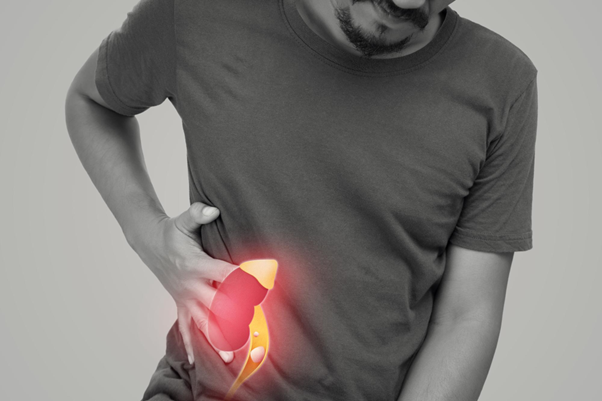Kidney stones are common and can cause severe pain. They form when minerals in your urine stick together and create hard deposits in your kidneys. These stones can vary in size, from tiny particles to as large as a golf ball, and they can stay in the kidney or move down into the urinary tract, causing discomfort.
Causes of Kidney Stones
Several things can lead to kidney stones:
- Dehydration: Not drinking enough water can make your urine more concentrated, which encourages stone formation.
- Diet: Eating too much salt, protein, or foods high in oxalate (like spinach and nuts) can increase your risk.
- Health Conditions: Issues like gout, urinary tract infections (UTIs), and certain metabolic disorders can make kidney stones more likely.
- Genetics: If someone in your family has had kidney stones, you might be more prone to them.
- Anatomy: Some people are born with urinary tract abnormalities that can lead to stone development.
Symptoms of Kidney Stones
The signs of kidney stones can vary:
- Pain: You may feel intense pain in your back, side, abdomen, or groin as the stone moves through your urinary system.
- Changes in Urination: You might have painful urination, see blood in your urine (hematuria), or notice that your urine is cloudy or foul-smelling.
- Nausea and Vomiting: Severe pain can cause nausea and vomiting.
- Fever and Chills: If you have an infection along with the stone, you might develop a fever.
Diagnosis and Treatment
Doctors diagnose kidney stones with imaging tests like CT scans, ultrasounds, or X-rays to see where the stones are. They also analyze your urine to check for minerals that could form stones.
Treatment depends on the stone's size and location:
- Pain Relief: Medications can help manage pain until the stone passes.
- Hydration: Drinking plenty of water is crucial to flush out smaller stones.
- Medical Procedures: Larger stones may need treatments like shock wave therapy, where sound waves break up the stone, or surgery to remove it.
Preventing Kidney Stones
You can lower your risk of getting kidney stones by:
- Staying Hydrated: Drink lots of water throughout the day.
- Diet Changes: Eat less salt, protein, and oxalate-rich foods. Try adding more citrus fruits like oranges and lemons.
- Medications: Your doctor might prescribe medicine to prevent stones from coming back, depending on the type you have.
Kidney stones are painful but treatable. Recognizing symptoms early and seeing your doctor promptly can help manage pain and avoid complications. Understanding what causes kidney stones and making lifestyle changes can reduce your chances of getting them and keep your kidneys healthy for the long term.
If you think you might have kidney stones or notice symptoms like severe pain or changes in urine, talk to your healthcare provider. Taking action early can make a big difference in how you feel and your overall health.




